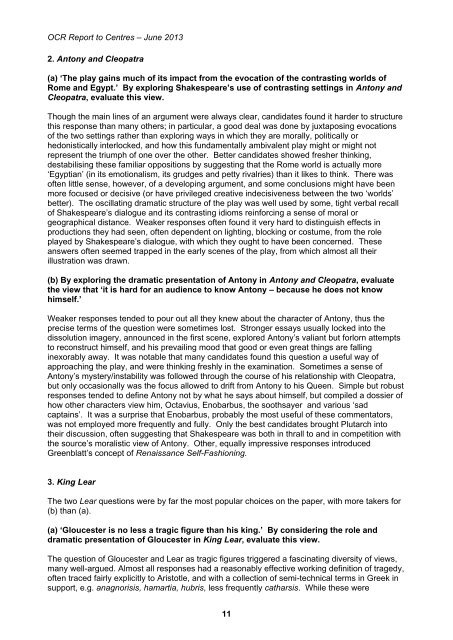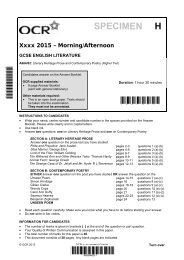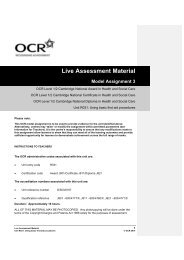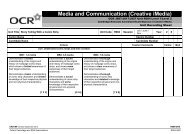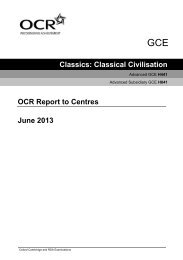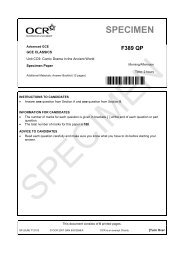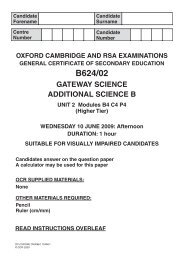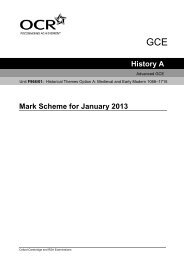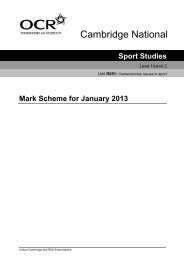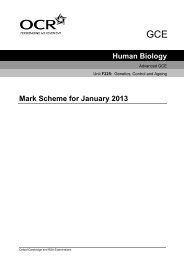Examiners' reports - June (PDF, 385KB) - OCR
Examiners' reports - June (PDF, 385KB) - OCR
Examiners' reports - June (PDF, 385KB) - OCR
Create successful ePaper yourself
Turn your PDF publications into a flip-book with our unique Google optimized e-Paper software.
<strong>OCR</strong> Report to Centres – <strong>June</strong> 2013<br />
2. Antony and Cleopatra<br />
(a) ‘The play gains much of its impact from the evocation of the contrasting worlds of<br />
Rome and Egypt.’ By exploring Shakespeare’s use of contrasting settings in Antony and<br />
Cleopatra, evaluate this view.<br />
Though the main lines of an argument were always clear, candidates found it harder to structure<br />
this response than many others; in particular, a good deal was done by juxtaposing evocations<br />
of the two settings rather than exploring ways in which they are morally, politically or<br />
hedonistically interlocked, and how this fundamentally ambivalent play might or might not<br />
represent the triumph of one over the other. Better candidates showed fresher thinking,<br />
destabilising these familiar oppositions by suggesting that the Rome world is actually more<br />
‘Egyptian’ (in its emotionalism, its grudges and petty rivalries) than it likes to think. There was<br />
often little sense, however, of a developing argument, and some conclusions might have been<br />
more focused or decisive (or have privileged creative indecisiveness between the two ‘worlds’<br />
better). The oscillating dramatic structure of the play was well used by some, tight verbal recall<br />
of Shakespeare’s dialogue and its contrasting idioms reinforcing a sense of moral or<br />
geographical distance. Weaker responses often found it very hard to distinguish effects in<br />
productions they had seen, often dependent on lighting, blocking or costume, from the role<br />
played by Shakespeare’s dialogue, with which they ought to have been concerned. These<br />
answers often seemed trapped in the early scenes of the play, from which almost all their<br />
illustration was drawn.<br />
(b) By exploring the dramatic presentation of Antony in Antony and Cleopatra, evaluate<br />
the view that ‘it is hard for an audience to know Antony – because he does not know<br />
himself.’<br />
Weaker responses tended to pour out all they knew about the character of Antony, thus the<br />
precise terms of the question were sometimes lost. Stronger essays usually locked into the<br />
dissolution imagery, announced in the first scene, explored Antony’s valiant but forlorn attempts<br />
to reconstruct himself, and his prevailing mood that good or even great things are falling<br />
inexorably away. It was notable that many candidates found this question a useful way of<br />
approaching the play, and were thinking freshly in the examination. Sometimes a sense of<br />
Antony’s mystery/instability was followed through the course of his relationship with Cleopatra,<br />
but only occasionally was the focus allowed to drift from Antony to his Queen. Simple but robust<br />
responses tended to define Antony not by what he says about himself, but compiled a dossier of<br />
how other characters view him, Octavius, Enobarbus, the soothsayer and various ‘sad<br />
captains’. It was a surprise that Enobarbus, probably the most useful of these commentators,<br />
was not employed more frequently and fully. Only the best candidates brought Plutarch into<br />
their discussion, often suggesting that Shakespeare was both in thrall to and in competition with<br />
the source’s moralistic view of Antony. Other, equally impressive responses introduced<br />
Greenblatt’s concept of Renaissance Self-Fashioning.<br />
3. King Lear<br />
The two Lear questions were by far the most popular choices on the paper, with more takers for<br />
(b) than (a).<br />
(a) ‘Gloucester is no less a tragic figure than his king.’ By considering the role and<br />
dramatic presentation of Gloucester in King Lear, evaluate this view.<br />
The question of Gloucester and Lear as tragic figures triggered a fascinating diversity of views,<br />
many well-argued. Almost all responses had a reasonably effective working definition of tragedy,<br />
often traced fairly explicitly to Aristotle, and with a collection of semi-technical terms in Greek in<br />
support, e.g. anagnorisis, hamartia, hubris, less frequently catharsis. While these were<br />
11


